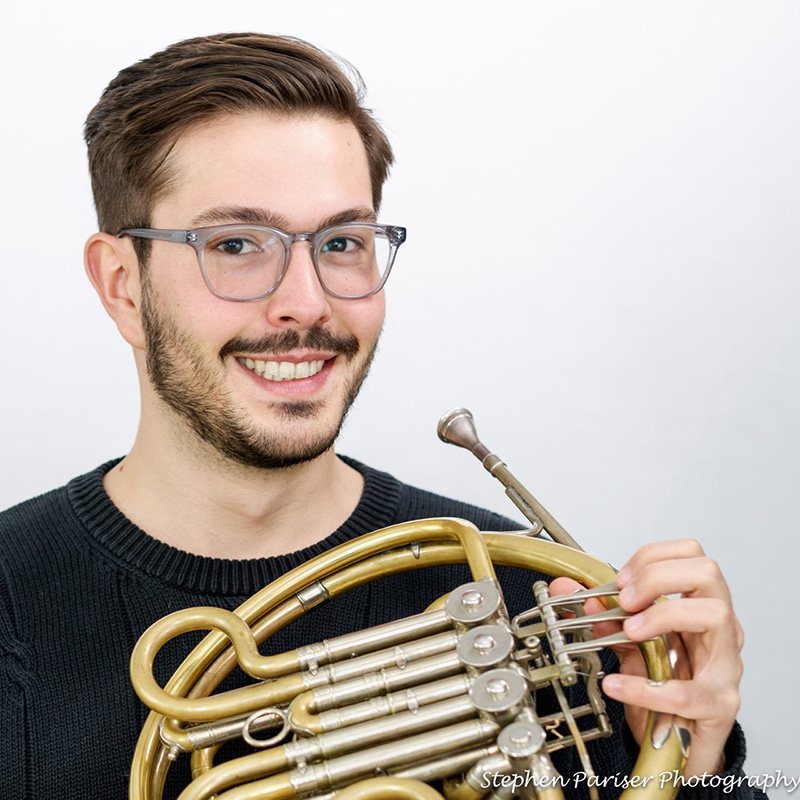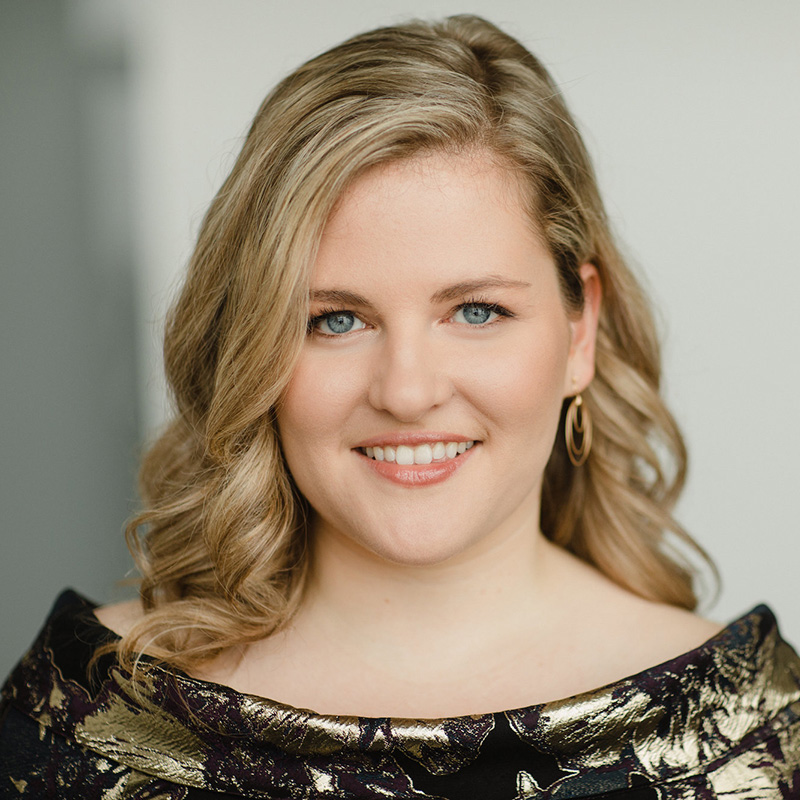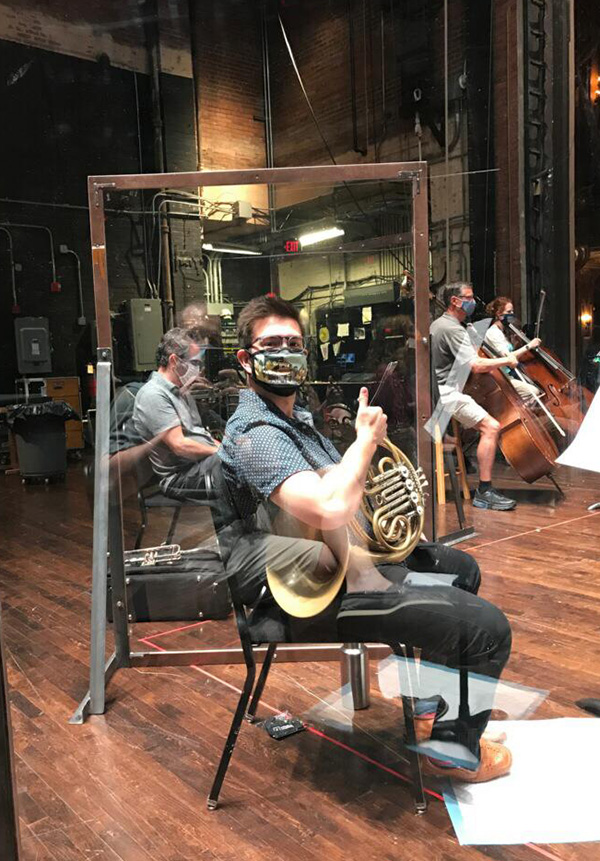Once upon a time … the OSM Competition
Based in Montreal and Ottawa, flautist Lara Deutsch’s distinguished career is one of versatility and recognition. Horn player Brian Mangrum was appointed Principal Horn of the Columbus Symphony Orchestra in Ohio, at the age of only 23. What do these two artists have in common? Both were awarded First Prize at the OSM Competition, respectively in 2014 and 2017. The OSM met with them to take stock of their accomplishments and to share some valuable advice about their competition experience at the Maison


When you think back on the OSM Competition, what is the first thing that comes to mind?
LD : The whole week was a whirlwind. I think the moment I remember most was how I felt when I walked offstage after my semi-final round. I had never felt as present and as artistically free as I did in those 45 minutes. I made mistakes and I didn’t even care (a big deal for a former perfectionist!). The adrenaline was still pumping and I felt completely elated.
BM : The first memory that comes to me is of being on stage for a sound check before the finals. As I entered the empty Maison symphonique, I felt a mix of excitement and nervousness, and I cherished the marvellous opportunity to play Strauss’ Concerto no. 2 at the Maison symphonique.
How did you prepare for this competition? Did you believe you had a chance to win it?
LD : I started planning and digging into my repertoire for the competition more than a year ahead of time. Having made it to the semi-finals previously (in 2011), I knew that I had to be much more prepared to feel like I was in control. That meant starting very early, recording myself often, planning a few mock performances, and getting to know my repertoire on a much deeper level, particularly to help my memorization. Going into the 2014 competition feeling like I had been so thorough in my preparation helped me to believe that I had a chance to win. That said, I had my doubts too…! Some days I felt unstoppable and other days I felt like I’d never be ready. That’s part of being human and also understanding the extremely subjective aspect of “competition” in the arts. You can’t measure the quality of a performance the same way you can time a 100-metre sprint down to the millisecond – so much depends on the artistic preferences of the jury. Learning to understand that and to let go of the final outcome made a big difference in my mindset.
BM : The year 2017 was my second time being a contestant in the Competition. In 2014, my memorization should have been more solid, and the week of the competition, I had some memory gaps during practices. As you can imagine, I was afraid of repeating these mistakes on stage, and that led to a lot of performance anxiety that could be heard in my performance. In 2017, I made sure I was capable of singing the pieces by heart before working on them on the horn. In the long run, distancing myself from the score while learning a piece allowed me to internalize the music, which gave me a lot more confidence on stage. I often recorded myself playing, and in the weeks approaching the Competition, I was able to play the repertoire for several teachers and their advice proved indispensable to my performance. Then I thought with a good night’s sleep and a bit of luck, I would be able to win the Competition.
The importance of mental preparation
LD : Without a doubt, the best choice I made in preparing for the competition (actually, the best choice I’ve made in my entire career), was seeking out the help of a mental performance coach. Leading up to the competition, I realized that being able to do my best had just as much (if not more) to do with having the mental skills to thrive in high-pressure moments as it did with my musical preparation. I’m very fortunate to have found Jean François Ménard, who has worked extensively with Cirque du Soleil, with many Olympians, and with major corporations all over the world. He completely changed my way of thinking and gave me the tools not only to succeed in the competition, but to actually enjoy my performance and to feel comfortable taking artistic risks. Among many other things, he taught me to “work smart” instead of “work hard”; to take nervous energy and turn it into excitement; to change the way I speak to myself in my head; and to trust myself. I still train with him ahead of any major performances, auditions, and competitions. My only regret is not having found him earlier in my education!
If you were to participate in the all-digital 2020 edition, what would you change in your preparation?
LD : First, I would make sure to get help with all of the technical aspects of the recording, in order to keep 100% of my mental energy and to focus the same way as usual. Secondly, I would treat the recording as if it were a “one chance” live performance, in the hopes of being present in the moment and putting forward the most artistic performance possible. When recording, you often listen to yourself with an overly analytical ear and adopt the mindset of “I can just do it again,” but there’s only so many times you can record a full performance before you noticeably run out of steam. Also, it’s easy when recording to fall into the trap of aiming for “technical perfection” at the expense of musicality.
BM : The difficulty is playing for a microphone and camera instead of live, in a concert hall. So, we have to pretend! You have to feel the audience’s energy or remind yourself that these same humans will be there, only behind their computer or television screens. It’s easier said than done. Good luck!
The OSM Competition as springboard
BM : It immediately had this springboard effect. First, it was extremely encouraging to win this award during the final year of my Bachelor’s at Rice University in Houston, and after the Competition, I had several auditions coming up for Masters and professional programs. Receiving the award for brass boosted my confidence at the perfect time. The Paul Merkelo scholarship provided me with the funds to travel to several auditions, including the one I won with Columbus in January 2018. I spent the rest of my cash prize on a new instrument, which makes my working life a whole lot easier. After the Competition, I played with the OSM a few times as a substitute, including during its European tour in 2019, and I have been invited to take part in the Classical Spree in the last few years. Winning this award was a tremendous help in starting my career, for which I am profoundly grateful.
Following one’s own path, one step at a time…
Although they won the same competition, these two musicians have embarked on widely different careers. Brian Mangrum left Quebec to take up a position as an orchestral musician, evolving within a single musical institution. Lara Deutsch embraced the life of a freelance musician, multiplying performance opportunities and diversifying her artistic projects. Brian is an avid sportsman, a hockey and soccer fan, activities he considers necessary to health of both body and mind and to protection from injuries. Lara, on the other hand, is a cooking and baking adept who enjoys the pleasure of tangible—and delicious—results in less time than it takes to put together a concerto! These two successful yet divergent careers demonstrate how the OSM Competition can support artists in making choices that lead down highly individual paths.
“Being a musician is an enormous privilege and the crisis has reaffirmed for me that this is indeed the role I want to have in society.” — Brian Mangrum
Today, you are Principal Horn with the Columbus Symphony Orchestra. What qualities does one require to be an orchestral musician, and what does it mean to be Principal Horn, compared to other musicians in the section?
BM : The orchestra is like a chamber music ensemble on a large scale. You need a good understanding of your score in relation to those of your colleagues and you also need team spirit. As Principal Horn, I am responsible for overseeing my section. I make certain musical decisions and manage other functional aspects, such as our placement on stage, liaising between the administration and our section, the rotation of players and scores, the list of substitute musicians … and so on. I think a Principal’s most important job is to inspire the trust and respect of his or her colleagues to encourage a spirit of cooperation that enables an orchestra to function smoothly. We sound our best when we all get along!
Outside of the orchestra, do you perform chamber music or are you involved in other musical projects? What are the rewards?
BM : I often play chamber music (often as part of a wind quintet) and occasionally give recitals. I do a lot of work with the brass section of the Columbus Youth Orchestra and give horn lessons. This variety brings me a lot of joy and a little bit of money! I love working with young people, especially those who are motivated. During the pandemic, we produced many physically distanced chamber music concerts, and those concerts really lifted both the musicians’ and spectators’ spirits.

What has changed for you, as a person and as an artist since the crisis we are going through?
BM : In the United States, we have just surpassed 215,000 deaths from Covid-19 owing to the government’s malicious negligence. What we hear in the news is appalling, and the orchestra’s musicians went through a period of near hibernation. Personally, I experienced a lot of apprehension and uncertainty. Now that we are slowly getting back to work, despite compromised conditions, I feel the importance of what we do even more. Music distracts and heals, and the world needs us. Being a musician is an enormous privilege and the crisis has reaffirmed for me that this is indeed the role I want to have in society.
Lara, you enjoy a great career and have won many prestigious awards but have not embarked on a permanent position in an orchestra. It is, therefore, possible to earn a living without being an orchestral musician?
LD : 100% Possible! Unfortunately, it seems there’s still a bit of stigma around being a freelancer, even if it’s the direction in which most people who pursue music will go these days. I have huge respect and admiration to all of my superstar freelance colleagues out there for their versatility, adaptability, and perseverance. The reality is that there are a limited number of jobs in orchestras and they don’t come up all that often. For me, the people in my life and my proximity to them are extremely important, as is the city in which I live. That means I’m not willing to move anywhere in the world for an orchestral job and it also means that I have to be willing to put the effort into growing my own freelance career to have the life balance I seek. By no means is that an easy thing to do, but I’m confident that no career in music comes without a lot of hard work.
Considering your work with Duo Kalysta, your solo performances, and activities with the National Arts Centre, you certainly are a versatile musician! Why is this versatility important to you?
LD : I am in many ways a creature of habit who loves routine, but I also love being able to do something different every day. I feel creatively energized when I have a variety of projects on the go. If I’m stuck on one project, I find it helpful to divert my attention elsewhere for a little while so I can come back with fresh ideas. At the same time, I enjoy not having to make my own artistic plans sometimes and I love to be part of a big team and sound, which is why I feel so grateful for my freelance orchestral work. I also find that having a versatile career forces me to develop a wide range of skills (marketing, grant-writing, accounting, artistic direction, etc.), so I feel like I’m constantly learning and I enjoy that. From an income standpoint, it’s helpful to depend on a variety of sources, since the amount of work I’m offered with one group might be more one season and less the next. It (thankfully!) always seems to balance out.
Some encouragement to young musicians in these uncertain times
BM : When I was hesitating about a career in music, my father would say, “There’s always room at the top, so if you want to do it, go practice!” The pandemic will end, and people will still want to hear good quality music. The industry will probably change slightly, but it certainly won’t die. Circumstances have proven that the world needs musicians, so someone has to do the job well!
LD : There’s a Martin Luther King, Jr. quote of which I often have to remind myself: “You don’t have to see the whole staircase, just take the first step.” Thanks to social media, we live in a world of comparison and it’s incredibly easy to get down on yourself about the things you haven’t done yet. My advice would be to figure out what defines career (and life!) success for you and to understand that your path might look different than what you expect. Say yes as much as you can, be open to taking risks and trying new things, and remember that life can surprise you. Be flexible. And be patient. A career isn’t built overnight. One step at a time.
See also: Lara Deutsch’s Website / Brian Mangrum’s Profile
